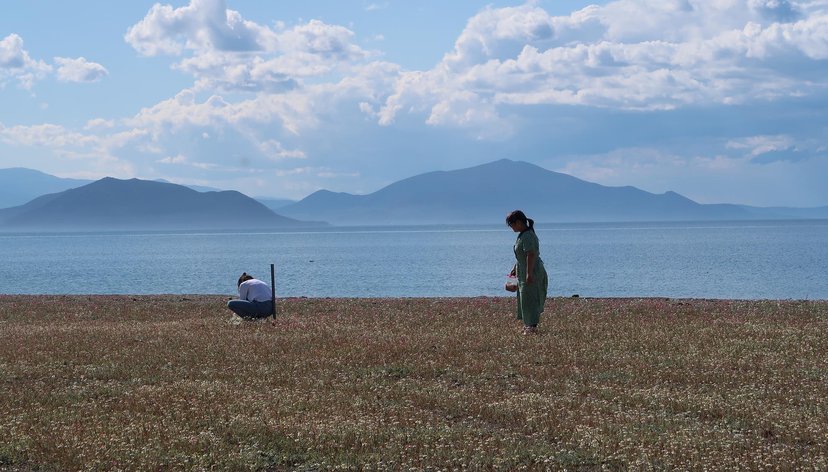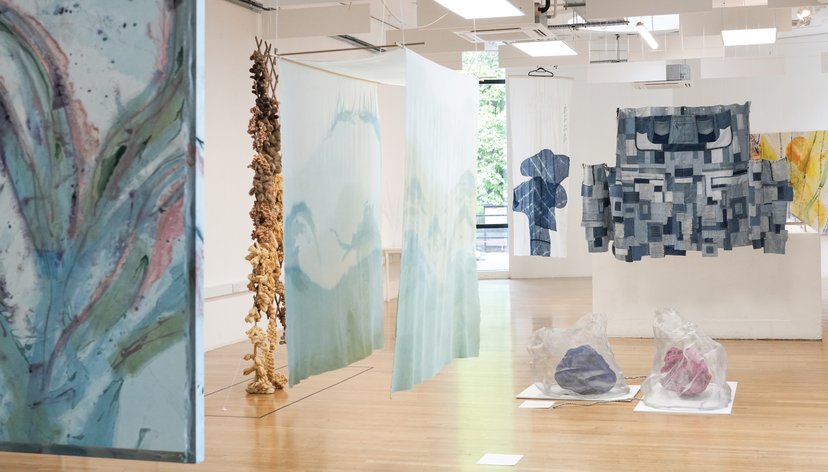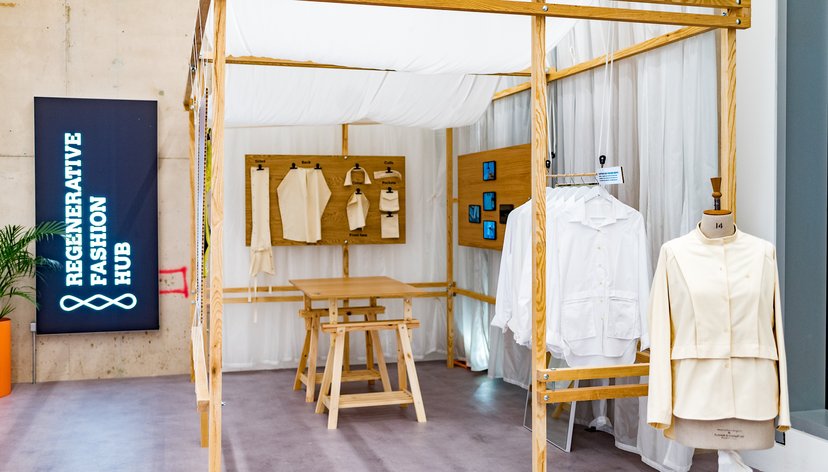Education for Sustainable Development
Jump to
The most impactful contribution that the College can make to address the climate and biodiversity emergency and support a swift transition to a more sustainable society is through the expertise and influence of our students and alumni, during and after their studies at the RCA.
Strategy for Sustainability in Teaching & Learning
Environmental sustainability is a core component of the College’s Strategic Plan 2022–27. The RCA aims to make global contributions to sustainability, climate change and the circular economy through research, knowledge exchange and the circular economy.
RCA Environmental Sustainability Strategy
In 2023/24, the Royal College of Art developed its first Environmental Sustainability Strategy, which outlines the steps towards the goals outlined in the Strategic Plan. It includes four pillars which were approved by the College Council on 10 July 2024:
- Net Zero
- Sustainable Resource Use
- Teaching & Learning
- Research & Knowledge Exchange
Teaching & Learning
The objective of the Teaching and Learning pillar is to:
“Embed environmental sustainability in all forms of teaching and learning so that students can contribute to and work within a more sustainable future.”
Our vision for 2027 is as follows:
“We will have supported students to apply creativity and innovation towards a sustainable future through teaching and learning. We will have created a framework for technical workshop framework to support sustainable practice. We will have supported staff to understand the environmental and social impacts of climate change and facilitate opportunities to share knowledge of sustainable practice and teaching.”
Strategy development
The Teaching & Learning pillar of the Environmental Sustainability Strategy was developed based on feedback received through the Annual Sustainability Survey and through consultation with members of academic and technical staff, including trade union representatives, within focus groups.
Delivery and reporting
The Environmental Sustainability Committee is responsible for supporting Programmes and Schools in incorporating environmental sustainability into all aspects of teaching and learning, in collaboration with relevant committees including Learning, Teaching and Student Experience Committee and Academic Standards Committee.
The Strategy includes a commitment to report transparently on our progress internally and externally, across all of the pillars including Teaching & Learning.
Progress on ESD
To support the development of the Teaching & Learning pillar, a high-level review of the current status of sustainability in the curriculum was undertaken and reported to the Learning, Teaching and Student Experience Committee and the Environmental Sustainability Steering Group in 2024. This included a scan of Learning Outcomes which reference sustainability in 2023/24 Programmes and Units, providing the baseline for tracking progress. Key Performance Indicators such as this will be reported annually from Autumn 2025, following the first year of strategy delivery.
AcrossRCA

AccrossRCA 2024 project Digital Puppet is a handbook for entering and driving new platforms.
AcrossRCA is a college-wide unit which is compulsory for all courses. This unit aims to support students to meet the challenges of a complex, uncertain and changing world by bringing them together to work collaboratively on a series of themed projects informed by expertise within and beyond the College. Across2025 students responded to four interdisciplinary themes, which acted as prompts to instigate meaningful and ambitious collaboration across programmes and disciplines: social justice; caring society; being digital; and climate crisis. View student projects from 2025 on the AcrossRCA digital platform.
Student projects and competitions

Ten Terra Carta Design Lab finalists showcase a wide breadth of innovations and solutions to help address climate change and biodiversity loss.
The RCA’s staff, students and alumni regularly participate in challenges to tackle sustainability and climate change issues. Recent examples include:
- Terra Carta Design Lab, launched in July 2021 by HRH The Prince of Wales and Sir Jony Ive. The initiative forms an integral part of His Royal Highness’s wider Sustainable Markets Initiative – in partnership with the RCA – and brings together staff, students and alumni to develop solutions to the climate crisis. Read more about finalists of the 2023/24 Design Lab.
- The RCA Grand Challenge – the biggest single-institution postgraduate design project in the world, bringing together multidisciplinary teams of students across the School of Design to address some of the world’s most pressing problems through a marriage of design and science, with the focus in recent years being on oceans and waterways. The 2024/25 Grand Challenge saw students explore innovative ways to support local communities and key stakeholders in building more resilient systems to tackle both current and future challenges. These challenges span climate change, public health, pollution, justice and inclusion, and broader socio-economic issues. Find our more about the winning teams and their projects in this news article.
Living Labs
Many projects at the RCA, including the Grand Challenge, function as Living Labs where students are able to contribute to environmental and social issues with local communities.
In the 2024/25 Grand Challenge projects, students have explored all 32 London boroughs to present distinctly resilient and robust design solutions to the most pressing socio-economic and ecological challenges facing local communities and stakeholders. These creative design proposals explore solutions around climate change, health, pollution, justice, inclusion and more, that are not only robust to current risks but also have the ability to adapt, change and recover. The winning projects were chosen by a judging panel including representatives from Royal Borough of Kensington and Chelsea, Yodomo and Ealing Council.
Other projects include the immersive exhibition Polar Zero, engaging local schools with the Terra Carta Design Lab exhibition and in the climate emergency art project A Greener Picture, and the research project Citizen Naturewatch.
Dedicated programmes
Many of the programmes at the College have a specific focus on sustainable development, including:
- MA Environmental Architecture: a one-year, design-led and field-focused course that emphasises a transdisciplinary approach to design research, bringing together architectural and ethnographic research methods.
- MArch Design Practice: a one-year programme that supports architects, designers, and spatial practitioners’ creative and critical engagement with the design of the built environment, with climate as a central focus
- MA/MSc Innovation Design Engineering: a double Master’s programme run jointly between the RCA and Imperial College London that promotes innovation through synergy between creativity, science and technology to create value for society.
Sustainability Statements of Intent
A Sustainability Statement of Intent (SSI) is a working manifesto to be discussed and contributed to by technicians, teaching staff and students. The aim is to clarify what sustainability means in the particular practical context of a given programme or medium, acknowledging the responsibility of academics, technicians and students to support and pursue sustainable practices, and to approach each programme’s materials, processes and production with a critical understanding of their impact.
SSIs are a component currently used within the RCA’s School of Arts & Humanities.
Access and participation
The College believes it is vital to provide visible pathways of access to study across our programmes for those suffering financial hardship and those from under-represented groups.
The RCA offers a range of scholarships that are open to students with refugee and asylum seeker status. These scholarships cover the full cost of study at the RCA; some scholarships also offer support towards living expenses. You can find out more about RCA scholarships.
As a research-led university, engagement is at the heart of all the College's academic activities. While the College does not have a formal Access and Participation Plan due to being a postgraduate institution, the RCA works closely with a diverse range of community partners and participants to develop collaborative projects and create a positive impact in the social and cultural fabric of our local, national and global communities. Recent activities include Climate Crisis Awareness with Wandsworth Primary Schools, aiming to inspire climate change awareness through creative workshops.


